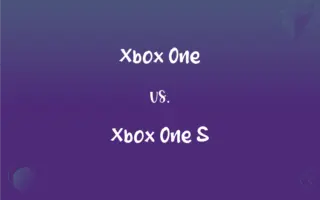Hard Copy vs. Soft Copy: What's the Difference?
By Aimie Carlson & Janet White || Updated on September 30, 2023
Hard copy refers to physical, printed documents, while soft copy denotes digital versions of documents or files.

Key Differences
"Hard copy" and "soft copy" are terms defining the format in which a document is presented. A hard copy refers to a document that has been printed and exists physically, providing a tangible interaction with the information it holds. Conversely, a soft copy indicates a digital version of a document, accessible through electronic devices, such as computers and smartphones.
The divergence between a hard copy and a soft copy emerges starkly when one considers their application in various scenarios. Hard copy finds its niche in situations where physical documentation is crucial, such as legal documents or certificates. Soft copy thrives in the digital realm, offering ease of transfer, sending, and storage in a computerized environment.
When discussing convenience, hard copies and soft copies each have their advantages and challenges. Hard copies can be accessed without the need for electronic devices and are often deemed more official in certain contexts. Soft copies, meanwhile, can be transported and shared effortlessly via electronic means, though they necessitate a device for access.
In the context of environmental and space considerations, hard copies generate physical waste and demand physical storage space. Soft copies, on the other hand, require digital storage space and consume energy through the use of electronic devices, but they do not directly generate physical waste.
The protection and preservation of hard and soft copies are also distinctively different. Hard copies are susceptible to physical damage or loss and demand physical safeguarding methods. Soft copies require digital protection against issues like data corruption, loss, or unauthorized access, often using backups and digital security protocols.
ADVERTISEMENT
Comparison Chart
Physical Presence
Yes, tangible and physical
No, exists in digital form
Storage
Physical space (shelves, files)
Digital storage (drives, cloud)
Transfer Method
Physical delivery or mailing
Electronic sending (email, cloud)
Susceptibility
To physical damage (tear, fire)
To digital issues (corruption)
Environmental Impact
Generates physical waste
Consumes energy, but less waste
ADVERTISEMENT
Hard Copy and Soft Copy Definitions
Hard Copy
Physical Document.
Please send a hard copy of the invoice.
Soft Copy
Easy Transmission.
I sent the soft copy via email.
Hard Copy
Tangible Record.
Keep a hard copy of the contract for reference.
Soft Copy
Requires Device.
To view the soft copy, use a computer.
Hard Copy
Printed Material.
The hard copy of the book was hefty.
Soft Copy
Electronic Document.
The soft copy is on the shared drive.
Hard Copy
Accessible Offline.
The hard copy can be read without devices.
Soft Copy
Intangible Data.
Soft copies can’t be touched or felt.
Hard Copy
Manual Transfer.
He mailed the hard copy to the client’s address.
Soft Copy
Digital Format.
Email the soft copy of the report.
FAQs
Can a soft copy be edited?
Yes, using appropriate software.
What is a hard copy?
A hard copy is a physical, printed document.
What does soft copy mean?
Soft copy refers to a document in digital format.
How is a soft copy shared?
It’s often shared via email or digital storage.
Can soft copies be accessed offline?
Yes, if stored on a local drive.
What is a disadvantage of hard copy?
It requires physical storage and is harder to share.
Can a hard copy be converted to soft copy?
Yes, through scanning or digitization.
Is a photocopy a hard copy?
Yes, as it is a physical, tangible copy.
Can a soft copy be converted to hard copy?
Yes, by printing the document.
How is a hard copy preserved?
Through physical storage, away from damage.
Is soft copy prone to viruses?
Yes, it can be affected by malware.
Can I certify a soft copy?
Yes, using digital signatures.
How is a hard copy created?
Typically, through printing a document.
Which is more secure: hard or soft copy?
It varies; hard copies are safe from cyber threats, while soft copies can be better protected from physical threats.
Which is better for the environment?
Soft copy, as it doesn’t generate paper waste.
About Author
Written by
Aimie CarlsonAimie Carlson, holding a master's degree in English literature, is a fervent English language enthusiast. She lends her writing talents to Difference Wiki, a prominent website that specializes in comparisons, offering readers insightful analyses that both captivate and inform.
Co-written by
Janet WhiteJanet White has been an esteemed writer and blogger for Difference Wiki. Holding a Master's degree in Science and Medical Journalism from the prestigious Boston University, she has consistently demonstrated her expertise and passion for her field. When she's not immersed in her work, Janet relishes her time exercising, delving into a good book, and cherishing moments with friends and family.






































































